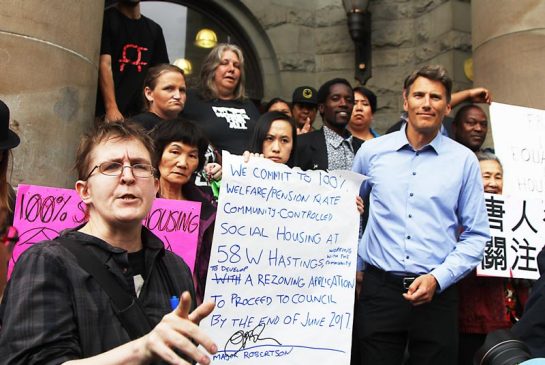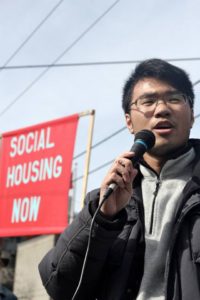
The shifting sands of Foundation funding for social housing
An interview with King-mong Chan and Beverly Ho from the Downtown Eastside Our Homes Can’t Wait campaign for welfare-rate social housing at 58 W. Hastings

On August 2nd the Downtown Eastside Our Homes Can’t Wait (OHCW) campaign and the tent city at 58 W. Hastings announced a win. The coalition, including nearly every community group in the DTES as well as the then-newly launched tent city at 58 W. Hastings, emerged from a tense meeting with Mayor Gregor Robertson to announce plans for a major new social housing building. In front of a crowd gathered in the Carnegie Centre theatre, the Mayor had put his signature on a flip-chart-paper version of the OHCW “community vision for 58 W. Hastings.”
This was not only a win because the promise heralds long awaited and badly needed homes for hundreds. It was also a win because the Mayor promised that this housing would break from the City’s gentrifying “social mix” models, and it would also break from the Province’s institutionalizing “supportive” models. But making this promise real, Mayor Robertson cautioned, would depend on getting the Province and other partners on side. And this problem of funding “partners” may be undermining the two great promises of 58 W. Hastings.
After the promise, OHCW attended weekly community meetings and negotiations with the City to push their demands and to strategize for the money needed to build and operate the project, which they planned to pressure out of the Province. In September the City came to OHCW with a proposal to do a joint news event to ask for the Province to step in and fund the housing.
As OHCW was discussing this proposal, the City of Vancouver revealed that they had been in talks with two other partners to fund and operate the housing. The City’s new partners were Vancouver Coastal Health and the “Vancouver Chinatown Foundation,” a new group that Beverly Ho, an activist with OHCW and the Chinatown Action Group, describes as “all big business people. They’re all CEOs and presidents.” So far, the City has been secretive about this new partner and how their involvement will influence the sort of housing that is developed at 58 W. Hastings.
Ho, who was at the centre of these negotiating meetings, responded to the news that the Chinatown Foundation would “oversee” and “govern” the housing at 58 W. Hastings. “We’re firm on not having supportive housing,” she said. OHCW has done a lot of work to define the housing they want at 58 W. Hastings, which some see as a non-institutional model to oppose to the medicalized housing BC Housing has funding as a default. OHCW wants:
- 100% of the housing at welfare shelter/pension rate for 1/3 Chinese and 1/3 Indigenous, a proportion of units for residents of African descent, and 1/3 DTES residents who are homeless or live in SROs with at least half of units to be held by women, and some units for people with disabilities;
- Run by and accountable to residents similar to the way co-ops are run, with residents covered by the Residential Tenancy Act and residents trained and paid to provide maintenance;
- 500 sq. ft. minimum unit size;
- Bottom floor to be free meeting space for community, cultural supports and peer services;
- Amenities like garden on top, balconies, and a fitness room.
The Vancouver Chinatown Foundation seems to have a different governance model in mind. According to their new website, they will run the housing.
An independently incorporated board of directors, appointed by the Vancouver Chinatown Foundation, will oversee the operation of 58 West Hastings following construction completion and tenancy, and will act as the governing body for 58 West Hastings. This board will be responsible for oversight of the third-party housing operator, operations and administration, and the management of commercial and health care tenant needs.
And the ambitions of the Chinatown Foundation board are not the only concern. Beverly Ho says, “Another of the City’s new partners is Vancouver Coastal Health, so now we’re worrying that they’re making 58 a mental health prison.”

King-mong Chan, an organizer with the Chinatown Concern Group and OHCW, explained that once the Chinatown Foundation showed up, the City started sidestepping the community-driven process they had started to set up. King-mong said, “On their website, it says that the Chinatown Foundation board will be making all the decisions with the city. That’s not what was agreed to. The community should be driving this process, not this Foundation.”
The community advocates feel like they’re in a no-win situation because the usual demand for tax-funded social housing is hard to make when it’s hard to tell where the charity group ends and the state begins. The Chinatown Foundation has created a special directive board for the 58 W. Hastings project, and it’s chock full of government bureaucrats – particularly from the provincial health authority. The Foundation will fund half the units at 58, and its health bureaucrat-bloated board will direct the planning and management. The City is hoping the Provincial government will fund the other half of the units, while its third-party social service groups carry out the planning and management.
At 58 W. Hastings, Our Homes Can’t Wait campaign is suffering the knot of state and civil society that is resulting from fifteen years of using health and harm reduction services to discipline the DTES poor, on top of twice that many years of snipping the threads of the tax-based government funded safety net.
So what does Foundation-funded housing mean? “We were all floored when Carol Lee [the chair of the Chinatown Foundation] said she would fundraise $30 million. She said it casually like saying she’d hold a bake sale. But money always comes with strings attached,” Beverly Ho said. “In a recent Chinatown Concern Group meeting, a resident asked why Carol Lee is interested in 58 W. Hastings. She says she’s concerned with the neighbourhood. But whose neighbourhood is she talking about? She kept saying the word ‘revitalize’ and ‘revitalization.’ Carol Lee’s idea of the neighbourhood is economic development and economic revitalization. She’s able to use her heritage to say ‘I’m Chinese and I’ll help you.’ But she grew up in money so even as a woman of colour I don’t know if she has the same experiences as a low-income Chinese senior fighting against their displacement in Chinatown. She has a different perspective about what ‘revitalization’ the community needs.”
While OHCW and the low-income community focus on winning the right sort of housing at 58 W. Hastings, the board members of the Vancouver Chinatown Foundation and their business partners keep other pieces moving around the chess board of the DTES.
King-mong Chan recalls, “While we work on defining the housing at 58 W. Hastings, the Wall Financial Corporation project at 288 E. Hastings is being developed as a gentrifying project which is displacing the Chinese low-income serving retail shops. Carol Lee’s father was a co-founder of the Wall Financial Corporation as well as on the Board of Trustees at the Chinatown Foundation. When the fight for these retail shops began last year, I would have wanted to see their family openly come out to support the businesses from being displaced.”
After the frustration of the City and Chinatown Foundation marginalizing OHCW at the 58 W. Hastings property, Beverly Ho is looking ahead. “Housing at 58 is definitely one battle among many,” she says. “Social mix rental gentrification at 288 E. Hastings, condo-powered displacement at 188 Keefer, the loss of Chinese low-income serving shops to places like the gentrifying pie shop on Keefer… that’s what we need to think about.”
From outside the hothouse of the fight for the right sort of housing at 58, it feels like the terrain of the fight for housing shrinks whenever communities get into detailed negotiations with the government. The homeless count this year shows there are 1,000 homeless people in the Downtown Eastside alone and there are still 5,000 SRO hotel rooms that will never be decent places to live and need to be replaced. This single project – although significant – still won’t make a dent in the crisis. Our desperation for homes can sometimes draw us into deals with politicians that want us to squabble like home buyers rather than fight relentlessly for broad governance and tax policy changes.
The clearest road out of this impasse is to continue to build the multi-racial coalition of Chinese, Indigenous, African, and low-income identified people and groups that have come together around the 58 W. Hastings campaign. Beverly explains, “OHCW focused on 58 W. Hastings as a win because we felt like we had some momentum there. We now want to focus on the Buddhist Temple, to get an Aboriginal Health and Wellness Centre that also has traditional Chinese and African healing practices too.”
It is difficult to find footing in the shifting sands of Foundation-government partnerships. To get the resources and culturally appropriate services low-income people need, under the control of the community itself and not punitive social service institutions, this community coalition will have to look past a single property and be prepared to bite the hands that feed.
